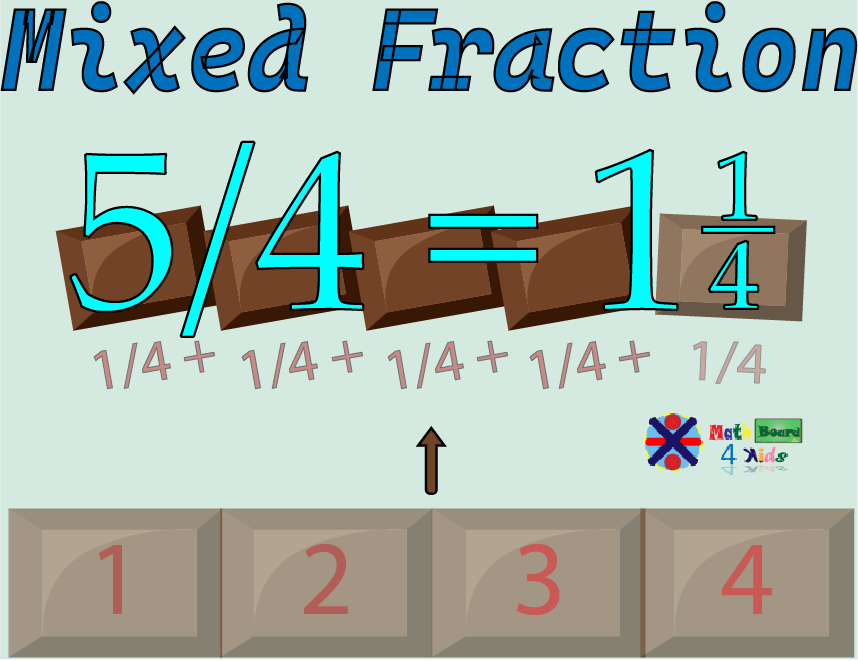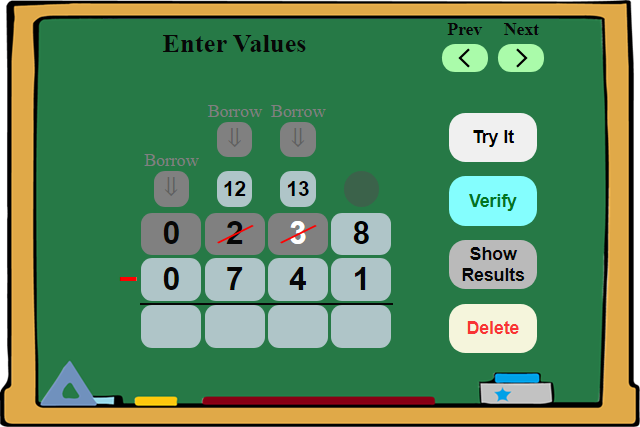A fraction is a way of showing parts of a whole (whether objects or values). It involves dividing something into equal sections and showing how many of those portions you have or have been taken.
The Whole
The Fractions or Sections

The word "fraction" is derived from the Latin word fractio, which means "a breaking" or "a broken piece." This comes from the verb frangere, meaning "to break." So, basically, a fraction refers to something that has been divided or broken into parts.
Fractions are really useful in everyday life. You can use them in activities like:
Recipes use fractions to show how much of an ingredient you need.
For example, you might need "1/2 cup of flour" or "1/4 cup of milk" to make a tasty treat.
We use fractions to talk about time,
like 1/4 of an hour
(which is 15 minutes) or 1/2 of a day (which is 12 hours).
In building or craft projects, you use fractions.
For example, you might need to cut a piece of
wood to be 1/4 of a meter long, or a piece of rope might
be 5/8 of a yard.
If you're sharing a pizza or splitting a treat with friends,
fractions help you divide things equally.
For example, if you have a pizza and 4 friends,
each person gets 1/4 of the pizza.
Fractions help us understand and manage money.
For example, if something costs $0.50, you can think of it as 1/2 dollar.
This visual representation can greatly enhance the understanding of fractions. Here you can visualize how it works:
- Imagine you have 4 friends and you have a whole pizza. If you want to share the pizza equally, you would divide it into 4 equal slices. Each of your friends would get then 1/4 (one-fourth) of the pizza.
- And this is what the pizza would look like once it is divided into equal parts.
The parts of a fraction are 3:
The top number shows how many parts of the fraction are being used or selected. It’s written above the line in a fraction.
The fraction bar is the line that separates the top number (numerator) and the bottom number (denominator).
The bottom number shows how many parts the whole is split into. It's written below the line in a fraction.
Fractions have special names based on their value,
which makes it easier to understand and talk about them in common situations.
Here are a few examples:
It means you have one of the two equal parts you get when you divide something in half.
It means you have two parts of something that was split into three equal pieces.
It means you have four parts of something that was divided into six equal pieces.
It means you have five parts of something that was split into eight equal pieces.
There are also other names like one-seventh (1/7), four-ninths (4/9), two-tenths (2/10), two-fifths (2/5), five-twelfths (5/12), and many more!
Fractions have different types based on the numerator and denominator, as shown below:
A unit fraction is a fraction where the top number
(numerator) is 1,
and the bottom number (denominator) is any whole number.
For example,
½,
⅓,
¼,
⅕
A proper fraction is a fraction where the top number (numerator) is smaller than the bottom number (denominator).
So, in a proper fraction, you have less than one whole. For Example,
¼,
⅖,
⅛,
⅞
An improper fraction is a fraction where the top number (numerator)
is bigger than or equal to the bottom number (denominator). For Example,
2/1,
4/2,
7/5,
9/8,
A mixed fraction is a combination of a whole number and a fraction.
It’s when you have more than one whole thing, but you still have a little bit left over. For example,
4⅕ = 21/5,
5/4 = 1¼,
9/4 = 2¼,
15/8 = 1⅞

Like fractions are fractions that have the same bottom number (denominator).
This means they are divided into the same number of equal parts, so they are easy to compare or add together. For example,
⅕ + ⅖ , or
⅞ + ⅝
Unlike fractions are fractions that have different bottom numbers (denominators).
This means they are divided into parts of different sizes, so they are not the same. For example,
⅙ + ⅘ or
⅖ + ⅛
Equivalent fractions are fractions that may look different, but they represent the same amount or value.
Even though the numbers are different, they still show the same thing.
For example,
½ = 2/4, or
⅖ = 4/10

Train with this easy subtraction board. You'll learn the basis of subtraction with our easy-to-do steps
Start Training
Take this challenge and become an expert with this hard subtraction board, solve as many problems as you can and learn from mistakes
Start Training
Training your basic addition skills is essential to become better at maths
Learn More